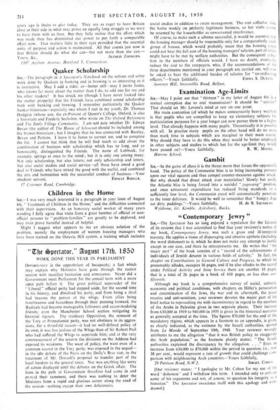“Contemporary Jewry
SIR, The Spectator has so long enjoyed a reputation for the fairness of its reviews that 1 was astonished to find that your reviewer's notice of my book, Contemporary Jewry, was such a gross and ill-tempered travesty. He applies a tissue of disparaging and abusive epithets (including the word dishonest) to it, which he does not make any attempt to justify except in one case, and there he misrepresents me. He writes that " the major part " of the book consists of a " record of the achievements of individuals of Jewish descent in various fields of activity." In fact, the chapter on Contributions to General Culture and Progress, to which he presumably alludes, occupies 16 pages, and if he also alludes to the record under Political Activity and State Service there are another 10 pages, that is a total of 26 pages in a book of 410 pages, or less than one- fifteenth.
Although my book is a comprehensive survey of social, cultural, economic and political conditions, with chapters on Hitler's persecution and extermination of the Jews, the war and its aftermath, the peace treaties and anti-semitism, your reviewer devotes the major part of hit brief notice to reproaching me with inconsistency in regard to the numbers of the Arabs in Palestine given in two separate places. Their increase from 630,000 in 1919 to 940,000 in 1935 is given in the historical narrative as generally accepted at the time. The figures 870,000 for the end of the mandatory regime, which appears in a footnote to an appendix, is given. as clearly indicated, as the estimate by the Israeli authorities, quoted from Le Monde of September 10th, 1948. Your reviewer wrongly attributes to me the allegation " that it was British policy to exaggerate the Arab population," as the footnote plainly states: "The Israeli authorities explained the discrepancy by the allegation. . . ." Even an increase from 630,000 to 870,000 within the period in question, i.e., over 38 per cent., would represent a rate of growth that could challenge com- parison with neighbouring Arab countries.—Yours faithfully, [Our reviewer states: " I apologise to Mr. Cohen for my use of the word dishonest' and I withdraw this term. I intended only to criti.:ise some of his arguments and not, of course, to question his integrity as A historian." The Spectator associates itself with this apology and with- drawal.]


































 Previous page
Previous page